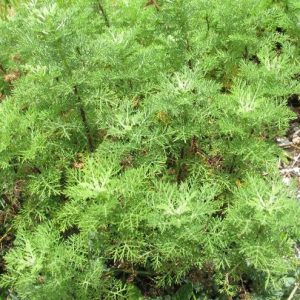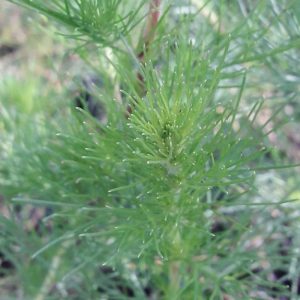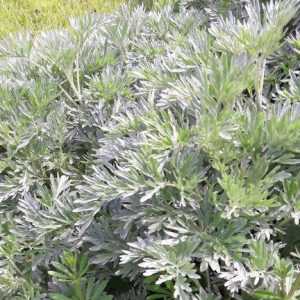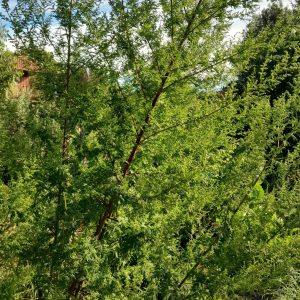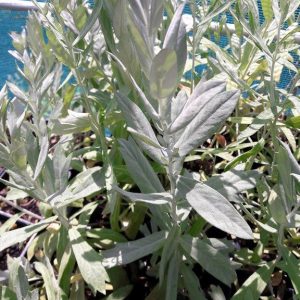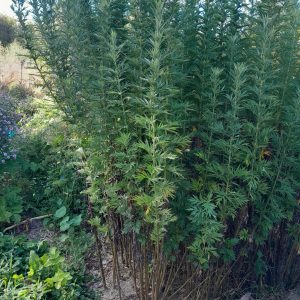LONG TERM OUT OF STOCK
SOLD OUT
OUT OF STOCK
AVAILABLE SPRING
AVAILABLE SUMMER
AVAILABLE AUTUMN
AVAILABLE WINTER
WINTER DORMANT
AVAILABLE SOON
$12.50
Artemisia princeps
Native to Japan, Korea and China, this plant is also known as Japanese Mugwort, Korean Mugwort and Korean Wormwood. The leaves can be eaten raw or cooked (blanched or boiled to removed bitterness) and added to salads, soups and rice, and are widely used in Asian cuisine in a number of different ways. In Japan the leaves are a fundamental ingredient of kusa mochi (“grass cake”), a Japanese confectionery, to which it imparts its fresh, springlike fragrance and vivid green coloring. Boiled leaves are also then pounded and added to glutinous rice dumplings called mochi. In Korea it is also used as both a culinary and medicinal herb, in dishes such as soups, pancakes and rice cakes.
Artemisia species are known for the powerful chemical constituents in their essential oils – substances such as terpenoids, flavonoids, coumarins, caffeoylquinic acids,and sterols which have been extracted for medicinal and other uses such as insecticides, antimalarials, cytotoxins, antihepatotoxic, fungicides, antibacterials, and allelochemicals.
Yomogi has been used in traditional Asian medicine for the treatment of inflammation, diarrhea, bacterial infection, and circulatory disorders and many studies have demonstrated its anti-oxidant and anti-inflammatory properties. It is one of the species used as moxa in moxibustion, and is also an excellent smudging plant used as a cold-hardy substitute to white sage, producing a smooth and cooling smoke that is said to purify the air and dispel negativity.
Yomogi is a vigorous perennial growing to 1.2m in height. Like many other members of this genus it can spread by underground stolons so it is good to plant it next to a mowing strip or in an area where you can benefit from its ‘generosity’ by harvesting stems to use as mulch for other plants. It is however very amenable to trimming and will also be quite happy in a pot. Also happy on light, poor soils, in fact Artemisias tend to be longer lived, more hardy and more aromatic when they are grown in a poor dry soil. Full sun or part shade, frost hardy.
One of our customers, Shinobu Kuroda, has kindly also given us the following information:
* Tempura with fresh harvests (and mix with mochi as you’ve mentioned )
* A lot to do with dried leaves
* Drinking tea: use lightly roasted leaves.
* Yomogi bath: make a small cloth sack (15cm x 20cm) and put the dry leaves in. Bath in with you
(effective for menopause and other feminine complaints).
* Yomogi steam: A steamer for the female genital area. Found a great description in English, so please
refer to: https://kotomise.jp/en_article/prim-rose/
* Yomogi warmer: add leaves in your wheat bag (can make one with brown rice or azuki beans as well) –
using a microwave with a glass of water to warm up the bag.
* Make moxa for pads – I used it during my pregnancy (recommended by my midwives). You’ll need to
put the leaves in a stone mill (or anything equivalent) to make fluffy moxa. Add some in a small fabric
bag and put on the tummy or the area you feel oddly cold/cool.
* Extract with vodka and sip a little on cold nights.
Hope you’ll enjoy yomogi as a natural women’s medicine too!!
9cm pot. Certified organic plant.
N.B. Shipping costs are added AFTER you have placed your order, you will then be emailed an invoice with bank details.

Smallest box rate:
This can fit up to 9 plants in 9cm pots.

Shipping a single tree can be expensive. We may be able to fit more in the box for the same price! See our shipping rates for single and multi tree boxes.

Combining sizes?
No problem, we will work out the best rate for you once you’ve placed your order.
Jo has a passion for growing herbs but is not a qualified herbalist and has no medical background.
We are lucky to have Patricia Beagle working here at times, who is qualified, and some of her advice does appear on these pages, but herbs act differently for different people and can interact with other medicines. We therefore always recommend that you consult with your own qualified health-care practitioner before using herbal products, particularly if you are pregnant, nursing or on any medications.
Kahikatea Farm cannot take any responsibility for any adverse effects from the use of the plants or a plant not having the effect it is reputed to have.
